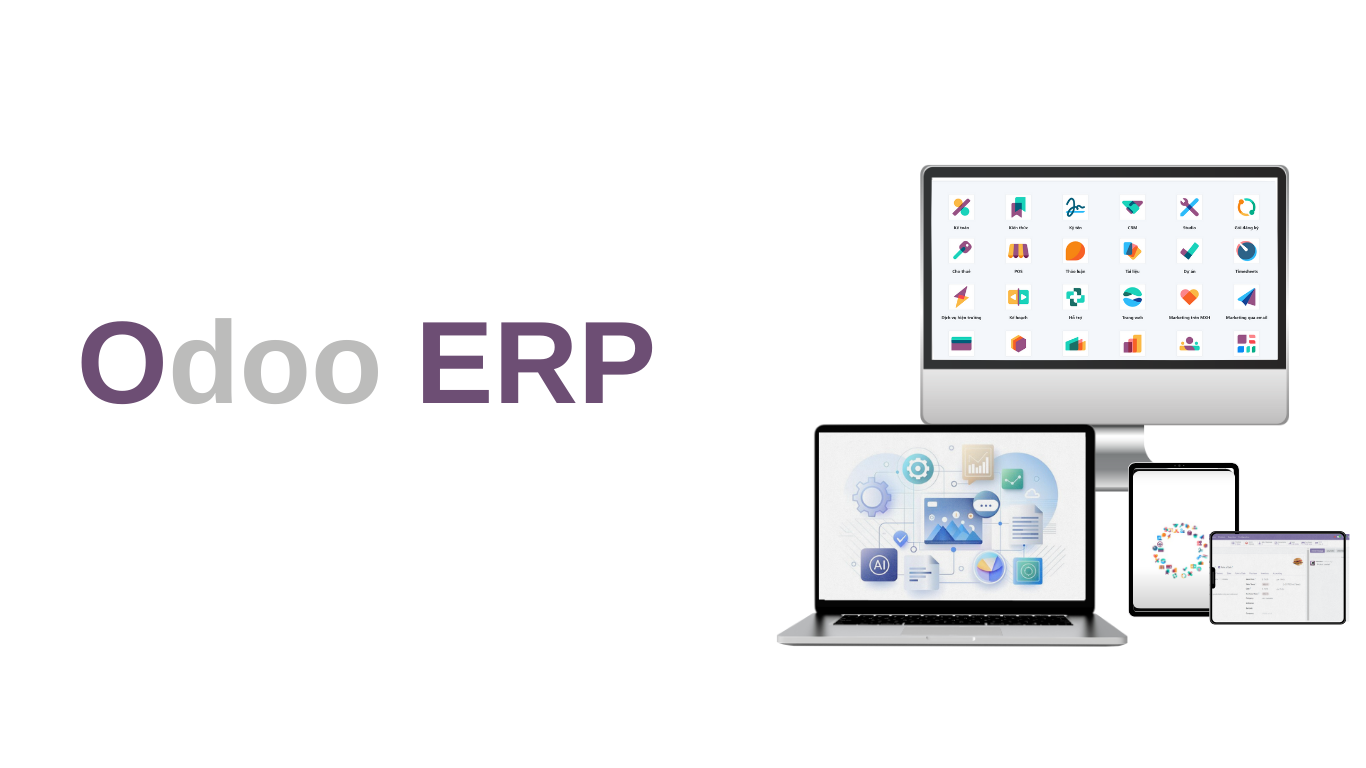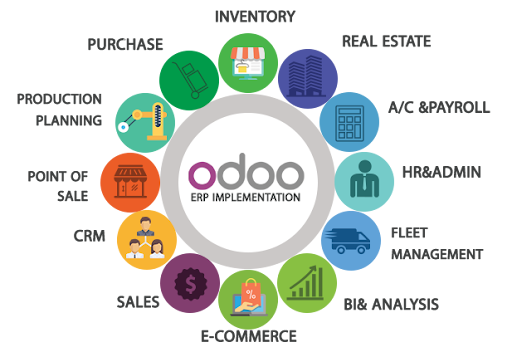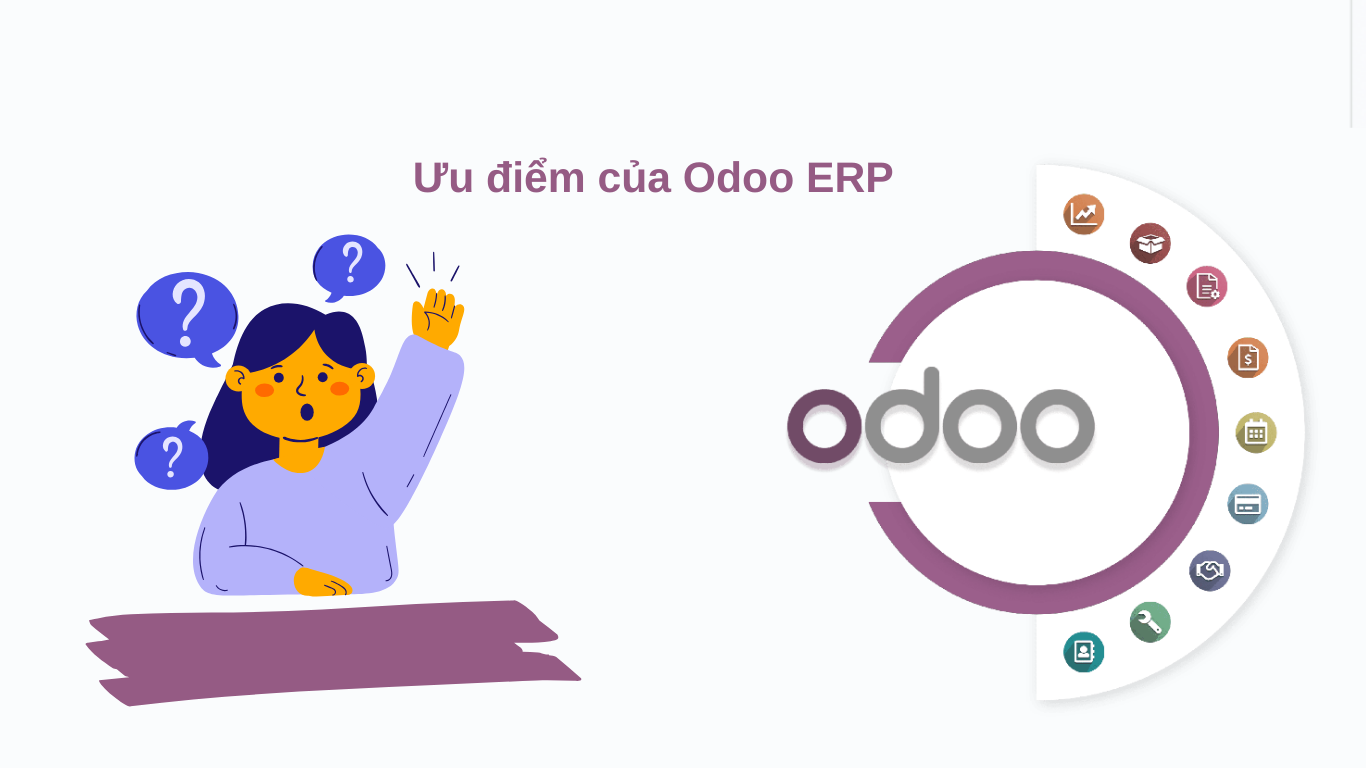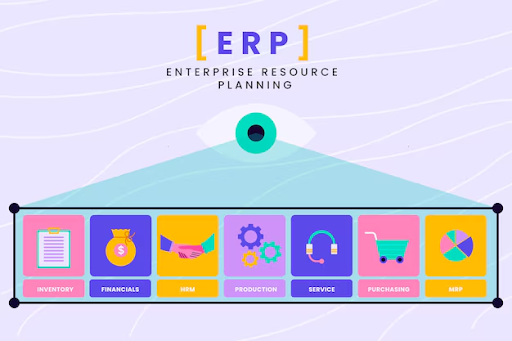In this article, we will delve deeply into Odoo ERP and the highlights it brings to businesses.
1. Introduction to Odoo ERP

Odoo ERP (Enterprise Resource Planning) is one of the most popular enterprise management software worldwide today, designed to help businesses efficiently manage their daily operations. From sales management, production, warehouse, accounting to human resources management,... Odoo provides a variety of modules to optimize all business processes within a single integrated platform.
Read more: What is ERP?
Odoo stands out due to its flexibility, high customization capabilities, and low implementation costs compared to other ERP solutions. Odoo ERP has both versions: Odoo Community (free) and Odoo Enterprise (paid). The Enterprise version offers more advanced features and full support from Odoo, while the Community version still provides all the basic features to meet the needs of small and medium-sized enterprises.
2. How does Odoo ERP work?
Odoo ERP operates on a modular basis, meaning it includes various applications (or modules) that can be installed and customized according to the needs of the business. These modules connect with each other and share data within a single system, providing the business with a comprehensive view of all its activities.
3. The main modules of Odoo ERP

Sales management (Sales)
The Odoo sales module allows businesses to manage the entire sales process from creating quotes, processing orders, to payment. All data related to customers, products, and sales prices are stored and synchronized within the system, helping businesses control revenue tightly and accurately.
Accounting
Accounting is one of the most important departments of a business, and Odoo ERP provides a powerful solution for financial management. With this module, businesses can automate processes such as bookkeeping, invoicing, tax management, financial reporting, and cash flow tracking accurately. Odoo also supports many international accounting standards, helping businesses comply with legal regulations in various countries.
Warehouse management module (Inventory)
The warehouse management module of Odoo ERP helps businesses optimize inventory management, track inbound and outbound goods, and tightly control the storage of products. Odoo provides real-time tracking features for warehouse activities, from receiving goods, inventory, to shipping, ensuring that businesses always have enough stock to serve customers without inventory issues.
Production management module
This module helps manufacturing businesses effectively manage the production process from planning, tracking materials, to controlling progress and product quality. Odoo ERP allows for the automation of production activities and provides real-time data management tools, helping to enhance efficiency and reduce waste.
Human resource management module
Odoo ERP provides a comprehensive solution for human resource management, including timekeeping, payroll, performance tracking, and contract management. All employee information is centralized in a single system, making it easy for the business to monitor and optimize resources.
Purchase management module
This module helps businesses manage relationships with suppliers, track orders, and optimize procurement costs. Odoo ERP provides analytical tools that help businesses make accurate decisions when selecting suppliers and managing contracts.
Project management module
Odoo provides project management solutions that help track work progress, assign tasks, and ensure that projects are completed on time and within the allowed budget. With its user-friendly interface and powerful collaboration tools, Odoo supports businesses of all sizes in managing projects effectively.
E-commerce
Odoo is not only a powerful ERP system but also integrates e-commerce features. The eCommerce module helps businesses easily build and manage online stores. From product management, payment processing, to order tracking, everything is integrated into a single system, making it easy for businesses to expand their operations on online platforms.
Other modules
In addition to the core modules, Odoo also offers a vast application store with a variety of management features, meeting all the management needs of a business.
4. Advantages of Odoo ERP

Odoo ERP has many outstanding advantages:
Comprehensive integration
One of the greatest benefits of Odoo ERP is its comprehensive integration capability between different departments of the business. Instead of using different software for each activity (such as accounting software, inventory management, CRM,...), Odoo consolidates everything into a single platform. This not only saves time but also minimizes the risk of errors when transmitting data between systems.
Flexible and customizable
Odoo ERP has a very high level of customization. Businesses can choose and install modules that suit their needs. Furthermore, Odoo also allows for user interface customization, the addition of specific features, and integration with external software through APIs.
Scalability
As the business grows, the need for management also increases. Odoo ERP is designed with high scalability, allowing businesses to easily add new modules and users without encountering infrastructure or performance issues.
Strong community
With the Odoo Community version, thousands of developers and businesses around the world are contributing to the development and improvement of this platform. This ensures that Odoo is always updated with new features and quickly addresses security issues.
Reasonable cost
Compared to other traditional ERP systems like SAP or Oracle, Odoo has a much lower cost, especially for small and medium-sized enterprises. Businesses can start with the free version and only pay when they need to use the advanced features of the Enterprise version.
5. The challenges when implementing Odoo ERP

Although Odoo brings many benefits, implementing ERP is not always easy. There are some challenges that businesses need to consider before deciding to use Odoo ERP:
Complex in customization
Although Odoo offers many customization options, this can also become an issue if the business does not have a strong enough technical team to implement them. Deep customization can take a lot of time and require programming skills.
Data transformation process
When transitioning from other management systems to Odoo ERP, businesses need to face the challenge of data migration and synchronization. This requires the data migration process to be carefully planned to avoid data loss or discrepancies during the transition.
Initial implementation cost
Although Odoo has lower maintenance costs compared to other ERP systems, the initial implementation costs (including installation, employee training, and system customization) are still a factor to consider for small businesses.
6. Odoo ERP compared to other ERP systems
When it comes to ERP systems, businesses often compare Odoo with other major solutions like SAP, Oracle, or Microsoft Dynamics. Each system has its own advantages and disadvantages:
- Odoo ERP: Flexible, easy to use, low cost, but requires high customization.
- SAP ERP: Suitable for large enterprises, with complex features, but high costs and requiring significant resources for implementation.
- Oracle ERP: Used by global enterprises, highly secure, but expensive and complex to manage.
- Microsoft Dynamics: User-friendly, integrates well with other Microsoft products, but not as strong as Odoo in customization and scalability.
7. Why choose Odoo ERP?
Easy integration and expansion
Odoo ERP can integrate with most popular software and services such as Google Apps, Shopify, Amazon, and many other systems. This helps businesses easily scale and not worry about the system being incompatible with existing tools.
Multilingual and multinational support
Odoo ERP supports multiple languages and regulations of many countries, helping businesses operate easily on an international scale. Especially for businesses with branches in multiple countries, Odoo can provide flexible solutions for comprehensive remote management.
Open platform
Odoo is an open-source software, meaning that businesses have the right to access and customize the source code according to their needs. This provides a level of flexibility that few other ERP systems can offer.
8. Which businesses should use Odoo ERP?

Odoo ERP is suitable for most businesses, from small to large. The modules of Odoo ERP can be customized and configured to suit different industries and business scales.
Small and Medium Enterprises (SMEs)
Reasonable cost: Odoo offers both free and paid versions with various price levels, suitable for the budgets of small and medium enterprises.
Easy to use: Intuitive interface, easy to use, does not require extensive technical knowledge.
Flexible: Can be customized to suit the scale and specific characteristics of each business.
Startup business
Integrating many features: Odoo integrates many modules such as CRM, sales, accounting, production... helps businesses manage all activities comprehensively from the start.
Easy expansion: As the business grows, you can easily add new modules without having to change the entire system.
Digital transformation trends
Comprehensive solution: Odoo provides a unified platform to manage all business activities, helping to simplify workflows and increase efficiency.
Integration with other tools: Odoo can integrate with many other applications and software, helping you build a complete IT ecosystem.
Businesses want to save costs
Reduce operating costs: Automate processes, minimize errors, save time and manpower.
Resource optimization: Efficient management of assets and inventory helps reduce inventory costs.
Industries suitable for Odoo
- Retail: Store management, warehouse management, online sales, customer management.
- Production: Production management, quality management, project management.
- Services: Customer management, project management, human resources management.
- Finance: Accounting management, budget management, tax management.
Factors to consider when choosing Odoo ERP
- Business scale: Odoo is suitable for both small and large enterprises.
- Business sector: Odoo can be customized to suit various industries.
- Budget: Odoo has many versions with different price levels for you to choose from.
10. Conclusion
Odoo ERP is a comprehensive and flexible business management solution, suitable for both small and medium-sized enterprises as well as large organizations. With powerful customization, expansion, and integration capabilities, Odoo helps businesses optimize their operational processes and enhance work efficiency. However, the implementation of Odoo also requires thorough preparation in terms of human resources and finances. If implemented correctly, Odoo ERP will undoubtedly become a powerful tool to help businesses develop sustainably in the digital age.
If you are interested in implementing Odoo ERP for your business, please contact Sota Solutions - Odoo's strategic partner in Vietnam for a free demo and consultation on the best ERP system implementation for your business.